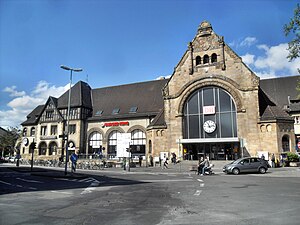Worms Central Station

Worms station from the east
|
|
| Location | Bahnhofstr. 7/11,Worms, Rhineland-Palatinate Germany |
| Coordinates | 49°38′5″N 8°21′25″E / 49.63472°N 8.35694°ECoordinates: 49°38′5″N 8°21′25″E / 49.63472°N 8.35694°E |
| Line(s) |
|
| Platforms | 8 (1–5, 8, 9, 11) |
| Construction | |
| Architect | Fritz Klingholz |
| Architectural style | Romanesque Revival architecture |
| Other information | |
| Station code | 6887 |
| DS100 code | FWOR |
| IBNR | 8000257 |
| Category | 2 |
| Website | www.bahnhof.de |
| History | |
| Opened | 1904 |
| Traffic | |
| Passengers | 10,000 |
Worms Hauptbahnhof is, along with Worms Brücke station and Worms Pfeddersheim station, one of three operational passenger stations in the Rhenish Hesse city of Worms, Germany. The station with is its pedestrian underpass is also an essential link between the eastern and the western parts of central Worms. Every day it is used by about 15,000 people.
The history of the railway began in 1836, when the governments of France and Bavaria were planning to build a railway along the western bank of the Rhine between Basel and Cologne via Strasbourg and Mainz. Two years later, however, the plans of the Grand Duchies of Baden, Hesse and the Kingdom of Prussia were dropped for economic and military reasons. Instead, the Main-Neckar line was built on the east side of Rhine. Finally, in 1844 some citizens in Mainz and Worms took the initiative to establish a company for building a railway from Mainz to Worms, which was eventually called the Hessian Ludwig Railway (German: Hessische Ludwigsbahn). But several factors such as the lean years of 1846 and 1847, the democratic uprising in 1848-1850, various competing schemes of private investors, to connect the line with Bavarian Palatinate and thus also to Alsace and Lorraine, meant that only on 29 August 1852, could a contract with the Grand Duchy of Hesse and the Kingdom of Bavaria be signed for the extension of the line from Ludwigshafen by the Palatine Ludwig Railway Company.
...
Wikipedia
